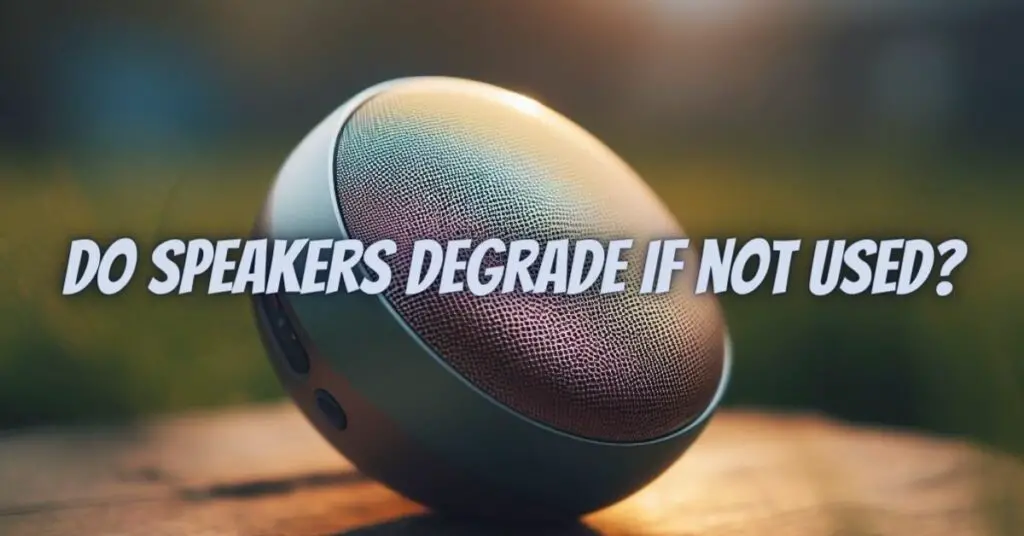Speakers are essential components of audio systems, responsible for transforming electrical signals into sound waves. While many audio enthusiasts invest in high-quality speakers to enjoy superior audio experiences, it’s not uncommon for speakers to sit unused for extended periods. This raises the question: do speakers degrade if not used? In this article, we will explore the factors that affect speaker longevity, how lack of use can impact speakers, and steps you can take to preserve their condition over time.
The Factors Affecting Speaker Degradation
Speakers are designed to deliver precise and high-fidelity sound. However, several factors can affect their performance and longevity, whether they are used regularly or not:
- Environmental Conditions: Speakers are susceptible to environmental factors such as humidity, temperature fluctuations, and exposure to dust and pollutants. These elements can cause wear and tear over time, even when the speakers are not in use.
- Materials and Components: The materials used in speaker construction, including speaker cones, surrounds, voice coils, and crossovers, can deteriorate with age, affecting sound quality.
- Magnetic Fields: Some components in speakers, particularly those with magnets, may experience subtle changes in magnetic properties over time, which can impact sound reproduction.
- Oxidation: Metal components, such as connectors and terminals, can oxidize over time, leading to connectivity issues.
- Spider Deterioration: The spider (a component that suspends the voice coil) may become stiff or brittle over time, affecting the speaker’s ability to move the diaphragm properly.
- Dust and Debris: Even when not in use, speakers can accumulate dust and debris, which can affect sound quality by altering airflow and damping vibrations.
How Lack of Use Can Impact Speakers
While speakers can degrade over time due to the factors mentioned above, the lack of use can exacerbate some of these issues:
- Stiffness of Components: Speakers are designed to move air efficiently and reproduce sound accurately. When not used, some components, like the spider and surrounds, may stiffen over time, making it more challenging for the speaker to operate optimally.
- Dust Accumulation: Dust and debris that accumulate in unused speakers can affect the movement of the speaker diaphragm, leading to reduced performance and a muffled sound.
- Cabinet Resonance: The speaker cabinet, especially in floor-standing speakers, can develop resonance issues if not used. Resonance can introduce unwanted vibrations and distortions in the sound.
- Connectivity Issues: Connectors and terminals on the back of speakers may develop oxidation, making it harder to establish a proper electrical connection when you eventually decide to use them.
Preserving the Condition of Unused Speakers
To prevent or mitigate the degradation of unused speakers, consider the following tips:
- Regular Maintenance: Periodically inspect and clean your speakers. Remove dust and debris from the speaker cones and cabinet.
- Storage Conditions: If you plan on storing speakers for an extended period, keep them in a dry, temperature-controlled environment. Use speaker covers to protect against dust.
- Speaker Exercise: Play music or test tones through the speakers periodically to prevent stiffness in components and ensure they remain in working order.
- Connector Maintenance: Clean and maintain the connectors and terminals to prevent oxidation. Applying contact cleaner or DeoxIT can help improve electrical connections.
- Cabinet Damping: Use internal or external damping materials to reduce cabinet resonance.
Speakers can indeed degrade over time, whether used or not, due to various factors. However, with proper care, maintenance, and occasional use, you can preserve the condition of your speakers and ensure that they continue to deliver high-quality sound when you decide to use them. Whether your speakers are vintage classics or modern audiophile-grade equipment, taking the time to protect and maintain them can extend their lifespan and keep them sounding as good as the day you acquired them.


